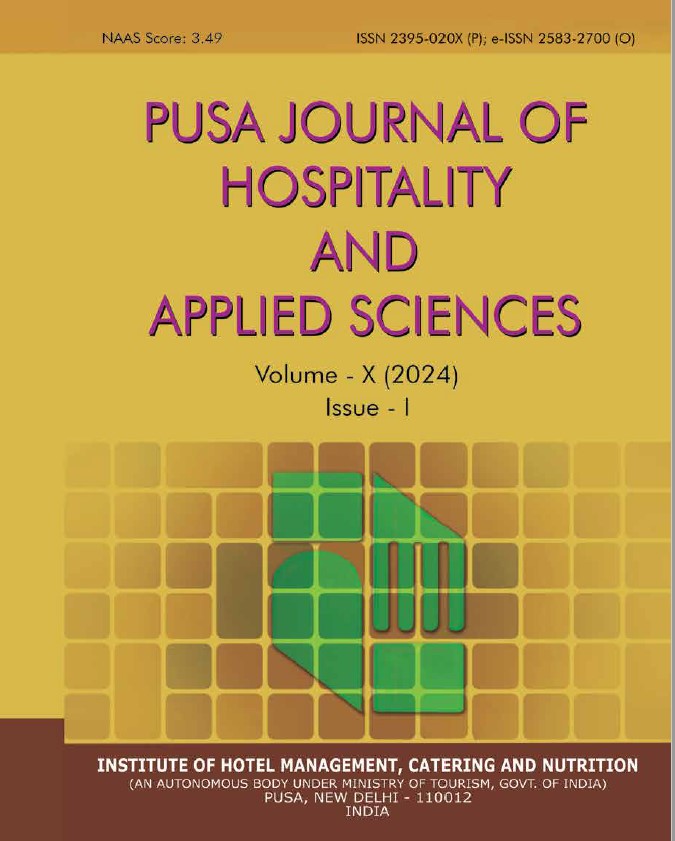A Study on Understanding Pre-Placement Perceptions, Mindset and Coping Strategies of Graduating Students in Hotel Management Programs in India
DOI:
https://doi.org/10.48165/pjhas.2025.11.1.9Keywords:
Pre-placement perceptions, growth mindset, coping strategies, Hotel Management graduates, NCHMCTAbstract
Background: The transition from academic life to professional employment is a significant milestone for hotel management students, demanding a blend of technical skills and adaptability to industry expectations. This study explores pre-placement perceptions, mindsets and coping strategies of final-year students in the field. Objectives: The study aimed to assess students’ perceptions of the job market, analyse their mindset toward placements and identify coping mechanisms, with a focus on gender differences. Methodology: A descriptive research design with convenience sampling was employed, collecting data through a structured questionnaire using Google Forms from 384 students at NCHMCT-affiliated institutions across India. A structured questionnaire measured perceptions, mindset and stress management strategies. Data analysis utilized SPSS, including descriptive statistics, T-tests and Chi-square tests. Results: Findings reveal that students hold optimistic pre-placement perceptions, with a mean score of 3.83 on a 5-point Likert scale (T = 31.247, p < 0.001), indicating a significant deviation from a neutral outlook. Students with a growth mindset demonstrated significantly higher proactivity scores (Mean: 4.2, SD: 0.8) compared to those with a fixed mindset (Mean: 3.1, SD: 1.1; T = 5.34, p < 0.001). Gender differences were significant in coping strategies, as males relied more on problem-solving approaches while females favoured social support. The most common coping mechanisms included family and peer support, along with self-motivation. Conclusion: The study underscores the importance of mentorship, workshops and gender-sensitive support to prepare students for placements. Recommendations focus on fostering resilience and providing institutional support to enhance career readiness.References
Bandura, A. (1997). Self-efficacy: The exercise of control. W.H. Freeman.
Brown, P., & Hesketh, A. (2004). The mismanagement of talent: Employability and jobs in the knowledge economy. Oxford University Press.
Deery, M., & Jago, L. (2015). Revisiting talent management, work-life balance and retention strategies. International Journal of Contemporary Hospitality Management, 27(3), 453-472.
Dweck, C. S. (2006). Mindset: The new psychology of success. Random House.
Dyson, R., & Renk, K. (2006). Freshmen adaptation to university life: Depressive symptoms, stress and coping. Journal of Clinical Psychology, 62(10), 1231-1244.
Griffith, W. (2003). Hospitality graduates and their perceptions of career success. Journal of Hospitality & Tourism Education, 15(2), 30-35. https://doi.org/10.108 0/10963758.2003.10696760
Gursoy, D., & Swanger, N. (2004). An industry-driven model of hospitality curriculum for programs housed in accredited colleges of business: Stakeholders’ perspectives. Journal of Hospitality & Tourism Education, 16(4), 13-20.
Kim, B. P., McInerney, J., & Alexander, M. (2014). The role of social support and social identities in the job search process among young adults. Journal of Career Development, 41(2), 94-108.
Lazarus, R. S., & Folkman, S. (1984). Stress, appraisal and coping. Springer.
McKeown, T. (2016). Perceptions of employability and career expectations of final-year hospitality students. Journal of Hospitality, Leisure, Sport & Tourism Education, 19, 17-26.
Murphy, K. (2012). Preparing hospitality graduates for the world of work. International Journal of Contemporary Hospitality Management, 24(7), 1112-1131.
Nabi, G., Walmsley, A., & Holden, R. (2010). Graduate career-making and business start-up: A literature review. Education + Training, 52(5), 429-446.
Richardson, S. (2009). Undergraduates’ perceptions of tourism and hospitality as a career choice. International Journal of Hospitality Management, 28(3), 382-388. https://doi.org/10.1016/j.ijhm.2008.10.006
Smith, R. A., Williams, C., & Johnson, K. L. (2018). Coping strategies and academic performance: Examining gender differences in the context of hospitality education. Journal of Hospitality & Tourism Education, 30(3), 159-
169.
Zhang, Y., & Lu, H. (2018). The role of growth mindset in the career readiness of hospitality students. Journal of Hospitality & Tourism Education, 30(1), 14-23.




